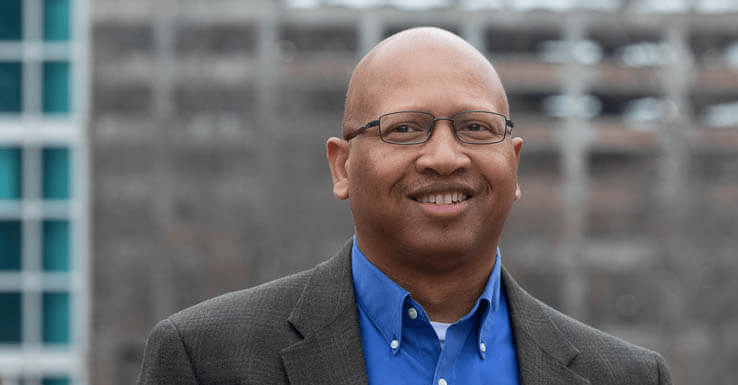
In his first week on the job, President Joe Biden signed several climate-related executive orders, including rejoining the Paris Climate Agreement, halting the construction of the Keystone pipeline and aggressively expanding and investing in efforts to fight environmental racism in disadvantaged communities that have suffered the most from pollution.
“We’re going to see far-ranging and far-reaching long-term positive impacts for climate change and communities of color, particularly those on the frontline or the fenceline, as we say, who are disproportionately impacted by environmental hazards,” Associate Professor Sacoby Wilson said of what he sees as a significant and transformative shift in the approach taken by federal leadership.
Dr. Wilson has spent his career working to advance environmental justice and said the executive order shows urgency in tackling what environmental justice communities have endured for generations with little aid or involvement from the federal government, until now. “Our regulatory agencies have failed these communities,” he acknowledged.
These communities may suffer from the pollution caused by industrial hog or chicken farms (known as concentrated animal feeding operations or CAFOs), by power plants, dumps and other industries that expose residents to a range of toxins, and from a lack of neighborhood resources that support health and often the political representation to ensure that their concerns are heard and respected.
Biden’s executive order will establish a White House environmental justice interagency council, direct the government to spend 40% of sustainability investments on disadvantaged and vulnerable communities, form an office of health and climate equity at the Health and Human Services Department and create an environmental justice office at the Department of Justice.
“When was the last president who put racial justice top on the agenda? The closest president who put racial equity upfront, partially because of what JFK did, was LBJ, through the Civil Rights Act and the Voting Rights Act,” Wilson said. “This is really, really important.”
Residents in low-income, marginalized communities are often exposed to issues like the burning of fossil fuels, chemicals, coal and landfills, leading to risks of developing asthma, cancer, heart disease and more.
These same communities, not surprisingly, are also being hit hard by Covid-19.
“We know that the pandemic is disproportionately impacting the same communities that are disproportionately impacted by environmental injustice, and they are the same folks who are at a higher risk from climate-related perturbations, Black and Brown folks,” Wilson said.
Wilson serves in many roles focused on advancing environmental justice, including through his membership on the US EPA's National Environmental Justice Advisory Council (NEJAC). He believes that the executive order and other Biden administration climate efforts will help to transform and shift toward a culture of green jobs, green entrepreneurship, renewables and other protective measures.
Through his Community Engagement, Environmental Justice and Health initiative, he collaborates with environmental justice leaders, activists, advocates and lawmakers to ensure that advancing justice and equity remain a top priority and to identify and implement the policy and legal tools to make real change happen.
Recently, he was instrumental in the planning that went into the Environmental Justice Mapping and Data Collection Act of 2021, a Senate bill proposed by Sen. Edward J. Markey (D-Mass.), Sen. Tammy Duckworth (D-IL) and Rep. Cori Bush (MO-01).
The legislation, if passed, would take “ground-breaking steps toward identifying and connecting environmental justice communities with policy outcomes,” according to Markey’s Jan. 28 press release.
The data would be used to develop maps showing the communities that face environmental injustices. The data would also accompany Biden’s executive order in regards to the 40% federal spending that will go to vulnerable communities, NPR reported.
Wilson helped to provide feedback to staffers about geospatial tools that would help collect data.
“One of my core areas is building geospatial tools for environmental justice, so I’ve been a major proponent of being able to visualize communities that have environmental justice issues,” Wilson said.
Being able to map out the dollars will be a crucial factor, he said.
“Once you target the communities that have issues like watershed restoration, stormwater management, air quality, pollution, etc, then you can target communities with investments,” he said.
On a state level, Maryland lawmakers have also turned their attention to tackling climate change and justice.
Sen. Paul G. Pinsky (D-Prince George’s) and Del. Dana M. Stein (D-Baltimore County)’s Climate Solutions Now Act of 2021 would reduce greenhouse gas emissions by 60% and plant five million trees by 2030, WTOP reported.
Ten percent of the trees would be planted in underserved areas like Baltimore City, which is recognized as an urban heat island where temperatures run higher than surrounding areas and known for higher rates of illness and chronic disease.
Wilson recently provided testimony for the bill and consulted with Pinksy on its details. Wilson said the bill has great potential and thinks the bill is a good foundation for what actions the state needs to take.
“I was excited to see that the bill added co-pollutants, which impact public health,” he said.
Wilson mentioned several impacts, including how explosive diesel exhaust can affect one’s short-term coordination and concentration focus.
Additionally, he noted that the bill also factors in proceeds that will help invest dollars into disadvantaged communities and make them more “climate-resilient.”
The bill, however, has room for improvement, Wilson said.
“There’s still more that needs to be done to ensure we have an equity and justice lens at all times and making sure that communities that have been used as dumping grounds and sacrifice zones for fossil fuels, etc, get more of the dollars to address those issues.”